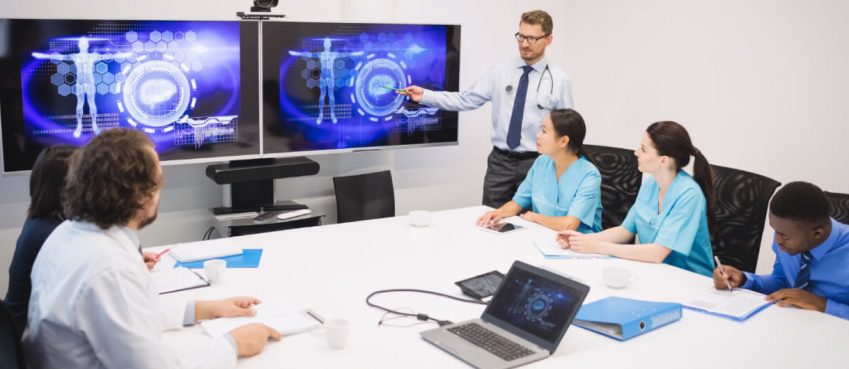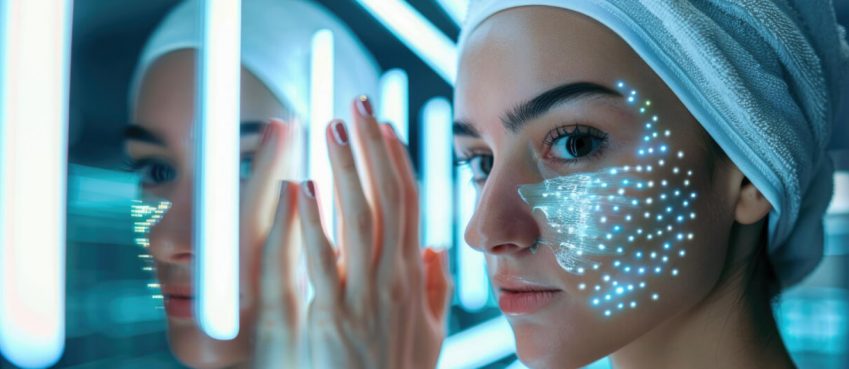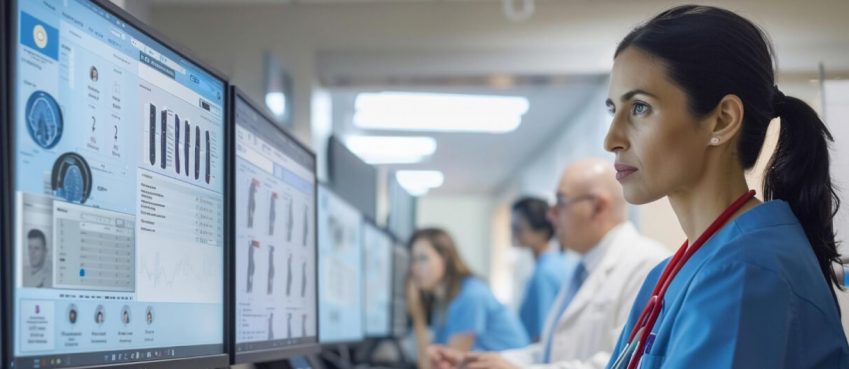
The Internet of Things is a network of physical objects wirelessly connected that share data and has revolutionized healthcare.
Remote healthcare is not disappearing.
60+ years ago, doctors made personal house visits to check on patients. Telemedicine allows patients to make “house calls”, thereby reducing the need for in-person visits. The practice of being able remote access medical care was a critical part of COVID-19. The IoT’s impact on healthcare extends beyond telehealth. The Internet of Medical Things has improved hospital and pharmaceutical operations and increased data accuracy.
Telemedicine is now at the forefront of healthcare technology, helping to prevent patient infections. IoT devices in hospitals help to regulate fridge temperatures and speed up emergency treatment. Outside of hospitals, patients wear IoT gadgets such as heart rate monitors and blood pressure cuffs.
Although these technological advances are groundbreaking, we only just began to explore the IoMT’s potential. Fortune Business Insights predicts that the market will grow from $57.62 million in 2019 to $352.88 million by 2027.
Healthcare: Use of IoT
Additional IoMT development is required. It has been extended to ERs and insurance offices as well as pharmacies. Let’s take a look at each area and see how it could be improved.
ER Medical Treatment
The IoT has drastically reduced wait times in the ER. Infrared sensors, RFID tags, and computer vision all capture real-time data about hospital beds availability. The admission process for patients in an emergency room is already faster thanks to the IoT.
EMTs can use the same data to transport patients to the hospital. EMTs can save time and lives by quickly redirecting patients to other hospitals if they know the hospital is full.
Infrared sensors can also monitor the hospital’s blood supply, as well as other biomaterials. EMTs can also use the information to determine where patients should be taken.
Upon registration at an emergency department, patients receive IoT-enabled ID wristbands. This allows institutions to evaluate the time taken by patients at each step and identify areas for improvement.
A badge that is IoT-enabled measures body rates. This includes blood pressure, pulse, temperature, and breathing rate. It could be the future of emergency medical care. If a patient experiences a fever while waiting to see a doctor, the tag will notify them.
Also read: How to choose The Perfect Domain NameInsurance Procedures
Sensor-based technologies such as wearables, biosensors, and mobile apps are used to collect patient data.
These sensors can also determine which medical procedures are best for each patient. Insurance companies can reduce the cost and scope of unnecessary exploratory procedures.
IoT technology also allows medical insurance companies to better assess risk and process claims. In addition, health insurance companies can include Telemedicine and virtual visits into their insurance products.
The IoT also speeds up the processing of claims. The system keeps track of claims and speeds up payments.
The future of medical insurance will use blockchain technology. Blockchain technology can speed up underwriting by using real-time IoT data. This system will reduce the need to obtain legal documents and save money for consumers.
Inspection of Pharmacies
The IoMT simplified pharmaceutical inventory. The Industrial IoT sensors provide real-time information about pharmaceutical stock movements and inventory using RFID tags and barcodes. This allows for increased drug fulfillment and restocking, as well as saving money on the pharmaceutical supply chain.
It is important to keep up with the regulations. The IoT allows companies to monitor their inventory in real-time and helps document industrial processes.
These IoT processes reduce documentation and guarantee fewer accounting and procedural mistakes.
Also read: 10 Top-Rated Face Swap AI Tools (Swap Photo & Video Instantly!)IoT Smart Gadgets for Pharmacy and Other Medical Purposes
These gadgets allow you to track the patient’s reactions and dispense medication. Patients who have difficulty remembering to take their prescribed medication are given smart tablets or ingestible sensor devices. Patients who forget to take their medication are automatically reminded by their smartphones. The sensor will contact the doctor if the patient has not taken their medication.
These tablets give doctors and patients feedback about how a treatment is working. It also guarantees better compliance with medication, which can lead to better outcomes for the patient. Clinical studies have shown this technique to be very effective.
Due to restrictions by the government, IoMT will not be used in other pharmaceutical procedures. However, they will eventually arrive. Patients will benefit from new techniques that improve their experience.
The Future of Healthcare is Linked
The Internet of Things (IoT), which has provided breakthrough inventions such as linked inhalers, contact lenses, and automated insulin delivery systems, has unquestionably improved healthcare.
The IoMT has improved the patient experience. Patients are able to access their medical care more quickly, with fewer visits, and they also have greater engagement. Providers have better data, diagnosis, time management, and more flexibility.
Healthcare IoT is set to bring more benefits to patients and practitioners.
Health and healthcare should be available to all people, not just those who have the means. Universal healthcare is fast becoming a requirement. Why? Because people want it.
Congress and the current administration already know this. The will to act is lacking because those who understand the workings of the government know that government waste will result in significant costs. I will cut down on waste and oversight. Maybe.
We can, however, be thankful for the IoMT’s help to the medical community and us.
Top 10 News
-
01
Top 10 Deep Learning Multimodal Models & Their Uses
Tuesday August 12, 2025
-
02
10 Google AI Mode Facts That Every SEOs Should Know (And Wha...
Friday July 4, 2025
-
03
Top 10 visionOS 26 Features & Announcement (With Video)
Thursday June 12, 2025
-
04
Top 10 Veo 3 AI Video Generators in 2025 (Compared & Te...
Tuesday June 10, 2025
-
05
Top 10 AI GPUs That Can Increase Work Productivity By 30% (W...
Wednesday May 28, 2025
-
06
[10 BEST] AI Influencer Generator Apps Trending Right Now
Monday March 17, 2025
-
07
The 10 Best Companies Providing Electric Fencing For Busines...
Tuesday March 11, 2025
-
08
Top 10 Social Security Fairness Act Benefits In 2025
Wednesday March 5, 2025
-
09
Top 10 AI Infrastructure Companies In The World
Tuesday February 11, 2025
-
10
What Are Top 10 Blood Thinners To Minimize Heart Disease?
Wednesday January 22, 2025







